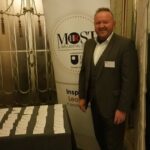On 6 April, I found myself back in a familiar pre-2020 situation. In a car to an airport at 2am. It felt a lot harder this time around than before. Out of that rhythm indeed. But it was for a good reason: a conference in the beautiful country of Slovenia called The LoveHR Summit.
At that conference, I had the honour of being the opening keynote speaker. I seized this opportunity to talk about research on the cycles of change, how these cycles apply to the HR profession, and the skills and gameplan required for HR to move through its next cycle. Below is a summary of my musings on this.
Cycles of change
Research from the USA by William Strauss and Neil Howe into huge waves of change had produced an interesting phenomenon and pattern. 20-year blocks of shifts in society, science, technology and life that had a striking cyclical nature.
Now, generational theorists will jump on this immediately as proof that Gen X, Y, Z is real. It’s another phenomenon but not as simplistic as some would have you believe in the media stereotypes that have become overly cliched labels for age groups. Yet these Four Turnings do starkly show us that human beings (seemingly making the same mistakes of previous generations) are part of four cycles of change:
- Highs (new discoveries)
- Awakenings (equalising, campaigning)
- Unravelling (crashes, societal shifts)
- Crisis (war, collapse, revolution)
No guesses for where we are now!
Against these four cycles of change (in 20-year blocks) we can even see how work has changed over similar blocks.
- State-controlled; free markets; tech/unicorns; conscious businesses
- Men exclusively; men dominantly; women more inclusively; anyone
- Factory; office; internet/digitised; automated & anywhere
We can also apply this to the HR context:
- Welfare and industrial relations
- Personnel and people administration
- Business partner and centres of excellence
- Activist, analyst, meaning-maker; developer
Evolution
So what IS next as the calling for HR and people professionals?
In HRZone’s State of HR Report signs were there of HR being:
- The prophet and sage (enlightenment, wisdom and relativity)
- The hero and merchant (value, virtue and vulnerability)
- The nomad and networker (transience, versatility, connectivity)
- The artist and warrior (imagination, pioneering, protection)
Now we won’t see these in any job board or description anytime soon, but they do talk to ‘sensibilities’ more than competencies. We need to have a sense of all of these things in our work in HR and increasingly – and thankfully not all at once usually – they are in play because of the organisations we work with and the people we support and enable to do the work of that organisation.
With an inclusive, networked-intelligent people profession we can achieve our next turning.
Value creation
Mapping this into something of tangible value is possibly the hardest part. How do we show a value on imagination and versatility when they’re so amorphous and difficult to define let alone measure?
The answer comes in a more sophisticated lens on value. Or rather six lenses, as explored in Colin Meyer’s book Prosperity: human, social, intellectual, material, natural and financial.
Human and social value matters so much. For example, in a high-pressure team environment, we know it’s not just good tech, processes and planning that matters. How bonded do the team feel to each other? How can we improve levels of trust so that the team can focus on the complexity of the task at hand?
Intellectual value is about capturing results and sharing these amongst other teams, saving hours of learning for others. And natural value is a driver behind why we at PTHR track our carbon footprint on activities beyond just car journeys and rail use.
If we focus on these richer fields of value it not only shows we’re being ESG-pro, it enables us to see the real impact of what we do.
All of this combines into the need to reinvent HR.
Reinventing HR
As I wrote for HRZone at the start of 2022, the profession doesn’t need adaptation or transformation – It needs reinvention. What does this involve?
Reimagining meaning – helping people answer the existential question “What matters about the work I do?”
Revitalising leadership – enabling leaders to look beyond results and show compelling clarity in their vision, help people make choices that add value and show compassion that they care about the planet, people, communities and economic fragility.
Revising the modelling for HR – including more versatility with enhanced focus, more agility with strong stability and a range of paradoxes to manage.
Revolutionising impact – Identifying organisational-level capabilities (which are then aligned to individual skills and competencies) needed to deliver a business strategy in line with its technology, intellectual property and material assets mapped to prosperity measures.
Revamping operations – Embodying agile, inclusive, capacity-creating systems
Revving-up teams – Embedding five crucial factors for teams: a compelling direction, a strong structure, a supportive context, competent coaching and being a truly united team of people.
Refreshing the gameplan:
- Build your collective intelligence: business, people, performance, culture = value
- Create that compelling direction, together: from your intelligence
- Craft that supercharged strategy for people, culture and performance
- Enlist leaders, players and participants to design, develop and deliver the strategy
- Maximise your agile capabilities to optimise your capacity, inclusion & choices for the team.
- Align, assess and accentuate the value creation, outcomes and impact of the strategy
- Review, adjust and go again…
Closing with a new turning
What happened in that room in Portoroz, Slovenia may dissipate with time, or it may tip the balance towards another turning. A fresh block. A new dawn and era.
I closed the session with a quote from the venerable Don Tapscott, a technologist and leading figure in the Blockchain Research world.
“This is not an information age, it’s an age of networked intelligence.”
With an inclusive, networked-intelligent people profession we can achieve our next turning.
[cm_form form_id=’cm_65a14c3f5da64′]






